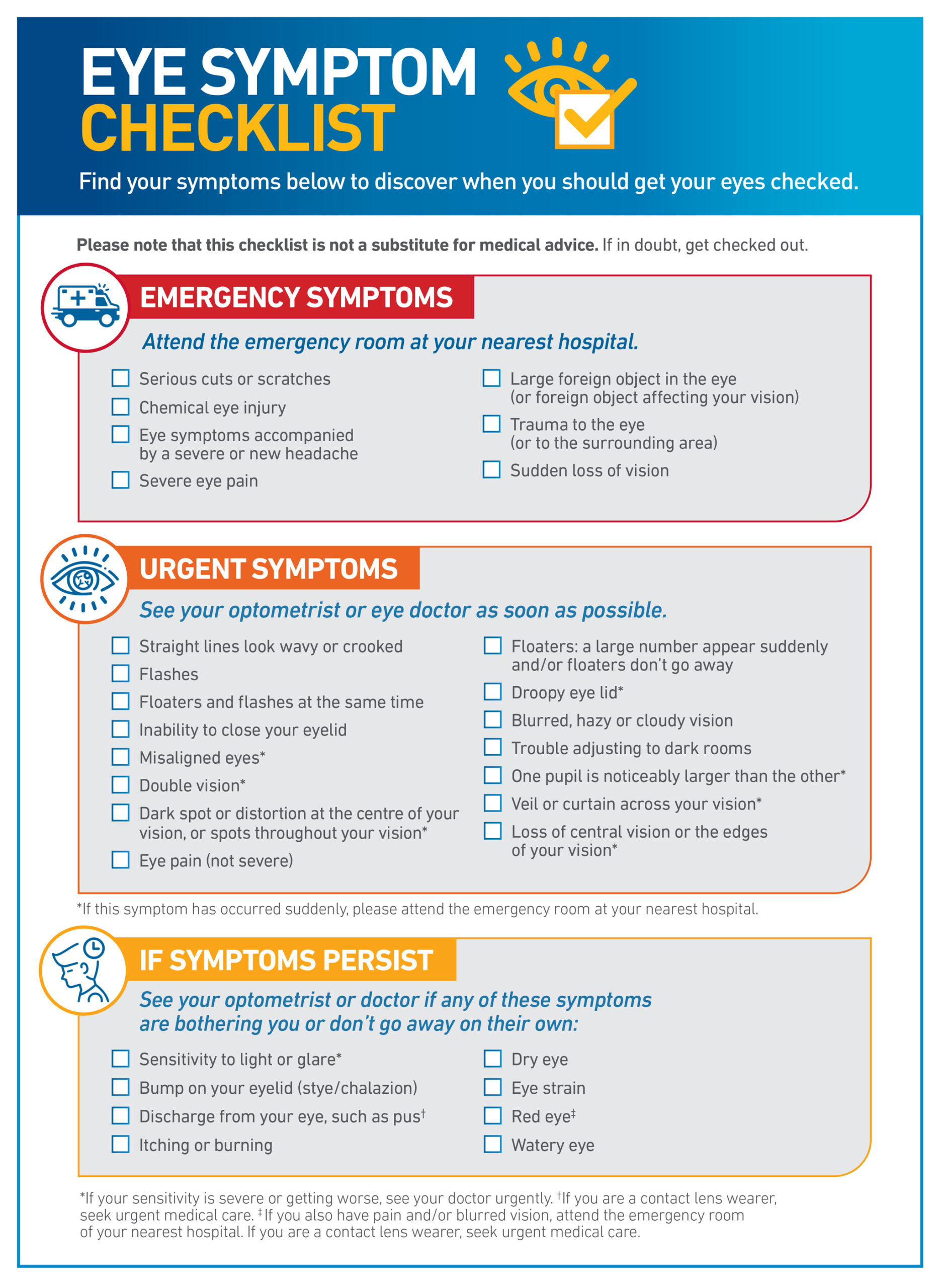"*" indicates required fields
Should I get my eyes checked?
21/10/2021
To help you answer this important question, we’ve put together the checklist below.

Download a printable copy of this checklist.
What happens if I don’t get my eyes checked?
Injury
Trauma and chemical injury to the eye can cause permanent damage. If you have sustained a serious blow or scratch to your eye, seek emergency medical care, especially if your vision is affected. Even a minor scratch to the surface of the eye may cause vision loss if infection sets in, so if you’ve injured yourself, it’s best to consult your optometrist. If you’re not sure whether your injury requires medical attention, call your optometrist for advice.
In case of a chemical injury, flush the eye out thoroughly with clean water for at least 10 minutes and then attend the emergency room at your nearest hospital.
Changes to your vision
Visual changes should always be checked out. While in some cases they may be caused by less serious conditions, such as dry eye or short-sightedness, they can also be symptoms of eye diseases that may cause permanent vision loss if left untreated. These conditions include glaucoma, retinal detachment, diabetic eye disease and age-related macular degeneration.
The same symptom can be caused by more than one eye disease, so in most cases, there is no way to tell whether your condition is serious without seeing someone.
The good news is that 90% of vision loss is preventable,1 especially if it is diagnosed and treated in its early stages. So, the sooner you get checked out, the more likely it is that your vision will go back to normal.
That’s why, if there are any changes to your vision, you should seek emergency or urgent medical care, as described in the infographic above. And if you’re not sure how quickly you need to be seen, simply call your optometrist or eye doctor and ask.
Lumps, bumps and discharge
These symptoms should be checked out by your optometrist or eye doctor. Styes and chalazion are common eyelid lumps that may be able to be managed at home with warm, wet compresses or over-the-counter treatments. However, if you are experiencing a lump or bump for the first time, don’t assume it’s a stye or chalazion. Instead, see your optometrist for a diagnosis and treatment.
Pus or discharge from your eyes may be caused by infection. If you are a contact lens wearer, you should see your optometrist or doctor urgently, as discharge (along with eye pain and redness) can be a symptom of a serious bacterial infection that can damage your eyes if left untreated.
Another common cause of discharge, redness and itching is conjunctivitis , also known as ‘pink eye’. If you have conjunctivitis symptoms, it’s important to get a COVID test straight away, as COVID-19 can cause conjunctivitis-like symptoms.
Dry, watery, itchy, irritated eyes may have many causes, including dry eye, Digital Eye Strain, hay fever or allergic reaction. If your symptoms are new, severe or don’t go away with your usual treatment, see your optometrist.
If in doubt, get checked out
If you are worried about your eye symptoms, whether they are listed above or not, please get in contact with your optometrist, eye doctor or GP. Acting early can save your sight. So, don’t ignore your symptoms.
- The International Agency for the Prevention of Blindness (IAPB). Understanding Data and Evidence: Treatable or preventable vision loss. London, UK: IAPB, 2020. Available at https://www.iapb.org/learn/vision-atlas/about/insights/data-and-evidence/treatable-or-preventable-vision-loss/ [Accessed 16 November 2021] ↩︎
The information on this page is general in nature. All medical and surgical procedures have potential benefits and risks. Consult your ophthalmologist for specific medical advice.
Date last reviewed: 2022-03-23 | Date for next review: 2024-03-23
